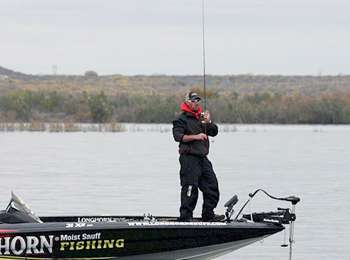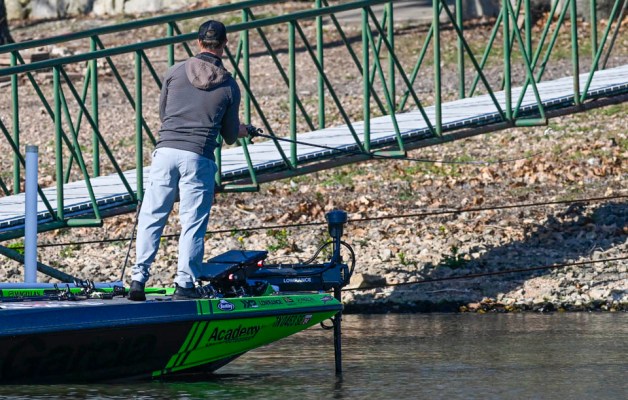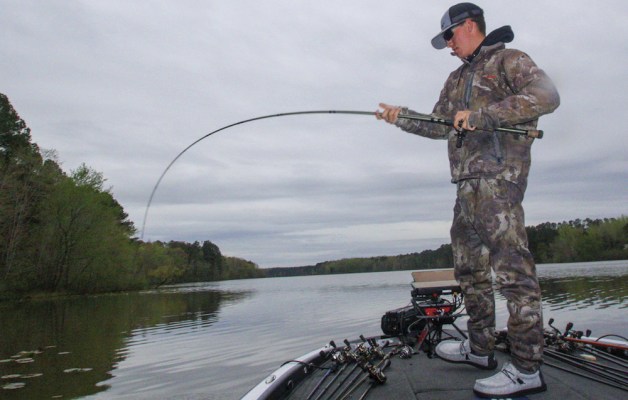
Edward T. Hall's book, The Hidden Dimension, outlines how different cultures handle context, time and space. Americans fall into the "low-context" category in which time is highly organized. It's all about seeing results quickly and efficiently.
So, how does a book written by a well-known anthropologist in the 1960s relate to bass fishing? When it comes to tempting bass in icy waters, our "results driven" culture often causes many anglers to overlook the process and focus on the product. When the water temperatures are hovering in the high 30s and low 40s, the key to productivity is in the details. In other words, you have to slow down.
"During the winter months, you can still catch bass on a jig, a drop shot and a shaky head, but you have to slow way, way down," explains Elite Series pro Jeff Kriet. "There's a big difference in the way I work my bait when the water is in the 40s as opposed to the 60s. When it's cold, I'm going to put the bait where I think the bass are located, and then I'm going to leave it there for a long time."
In the coldest months of the year, Kriet opts for dragging his jig or worm across the bottom rather than hopping or shaking it like he would in warmer conditions. "I'll barely move the bait," he says. "I'm going to pull it really slow and then leave it in the key areas as long as I possibly can. When the water is really cold, a bass' metabolism slows to the point where they don't have to eat very often."
Even when he is throwing hard baits like a Shad Rap or jerkbait in cold water, Kriet makes sure to use an ultraslow retrieve. Rather than cranking the offering back to the boat, he'll wind the bait to the desired depth and then use a sweeping or pulling motion with his rod. During a retrieve, the only thing he uses the reel for is taking up the slack line created with each sweep of the rod.
Kriet says that preparing mentally for a slow day on the water is one of the hardest aspects of midwinter bass fishing. "You have to go out knowing that you're fishing for just a few bites the entire day," he admits.
Throughout the course of the day, he will constantly remind himself to slow down and fish methodically. "I'm bad about speeding up when I'm not getting bit," he admits. "If you're mentally prepared, you'll be able to take advantage of the windows of opportunity that open during the day."
On a typical winter outing, Kriet says there are generally only one or two "windows of opportunity" to put bass in the boat. When they do decide to bite, the action can be fast and furious.
"You'll fish for four hours without a bite and then have a flurry where you catch five or six bass and then go another few hours without a bite," he says. "You just have to be prepared to make those bites count. You have to grind it out."
Kriet also believes that anglers who live in areas that allow them to fish through the entire winter season and who take advantage of that opportunity are better off once spring rolls around.
"The guy who has been hunting and watching football all winter is going to get on the water the first nice day of spring and just assume that he's going to catch the heck out of them. The guy that has been fishing all winter long is mentally prepared for a slow day and only getting a few bites."
Kriet points to his sixth place finish in the 2008 Bassmaster Classic on Lake Hartwell as an example of the importance of fishing throughout the year. "It was miserably cold during the Classic, and I had to fish my jig painfully slow just to get a bite," he remembers. "I would spend maybe five minutes on a single cast because I was moving my jig so slowly. I had been fishing all winter, so I was mentally prepared to fish that way, and that's why I think I had such a solid finish."
He offers this piece of advice for anglers willing to brave the cold weather elements, "If you think you're fishing slowly enough, slow down even more. Once you get a bite, fish even slower and pinpoint the productive areas."
Originally published January 2011




